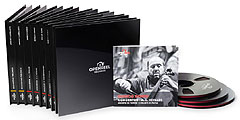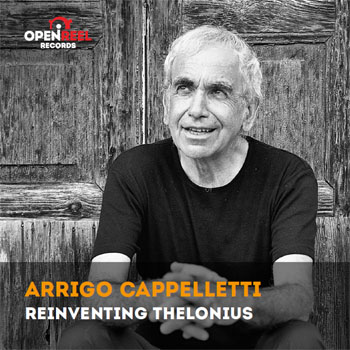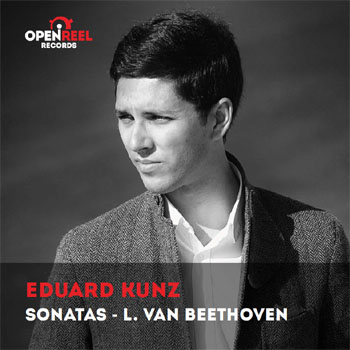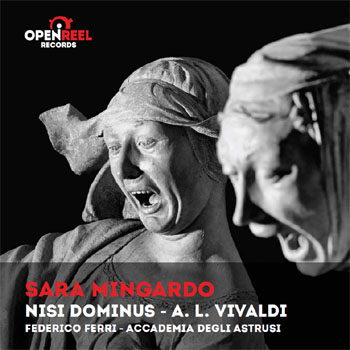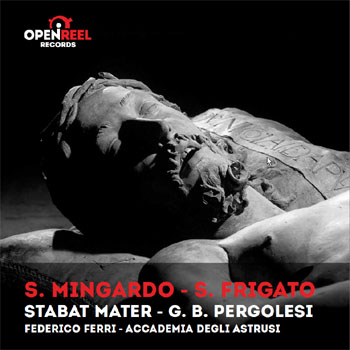| |
 | | 
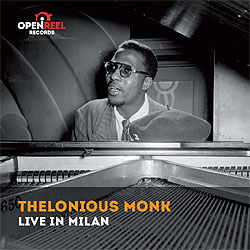
|
THELONIOUS MONK  LIVE IN MILAN
(tape 1 & tape 2) |
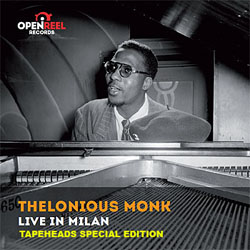
|
THELONIOUS MONK  Tapeheads Special Edition
LIVE IN MILAN
(tape 1 & tape 2) |
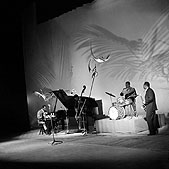
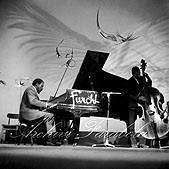
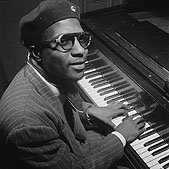
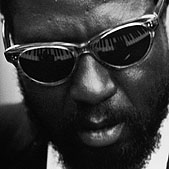
| Home > ArtistsTHELONIOUS MONK  | ... it 's always night , or otherwise we would not need light ... | | | Thelonious Monk |  | |
For years it has been normal to talk about protest and anger when referred to black jazz musicians who played in a modern and different style : the result of social conditions, revolutionary aims and vindictive rage. All this was attributed to whoever made music that was restless and dissonant and sometimes broken up by shrieks and whistles. The first time Thelonious Monk came to Italy, the press introduced him to its readers as such. In as much as his music was dark and contorted, here and there lit up by sinister flashes, it was easy to imagine a smell of sulphur, a cold anguish and that in itself was enough.
But Monk was not made that way. On the contrary, it was like betraying himself, preventing understanding. His connections with the outside world are not frequent, his desire to communicate with others is nil. Far from being an involved artist, a socially aware person, Thelonious is like a big baby, of boundless egoism, for whom the rest of the world is totally unimportant. In a rare interview in 1964 this became very obvious. Valerie Wilmer was an English journalist and photographer who loved jazz and when she questioned him about the civil rights struggle of his fellow black Americans, he said : "I know virtually nothing about it …. These racial problems are not in my thoughts. Everyone tries to make me think about it, but I am not troubled by them. The only thing that bothers me is the people who try to make me think of those things".
So, a big baby, who at a certain point discovered ( but later, after a number of years had passed before his music was appreciated) that what he had always done instinctively and playfully, was highly admired by others who paid to come and listen to him. He did not ask himself why, nor did he try to gain a larger audience. He was very happy with his success, particularly because it allowed him to buy not only beautiful clothes, but also a large number of hats of all shapes, to live in the best hotels in the world and to indulge in large ice creams (brought to him by his wife Nellie, whom he ordered about as spoiled babies do with their mothers). Many other things did not seem to interest him and for quite a few years he did not think about moving away from his modest apartment in St. John's Hill, one of New York's black areas, where he had always lived and just about managed to survive on the meagre sales of his disks and his wife's modest earnings.
Thelonious Monk came to Italy several times to give concerts with his quartet. The first one was in Milan in 1961 - the result was sensational, particularly because the disks that he had recorded in the preceding months for the Riverside and which showed his talent, had not yet arrived in Italy. Before his concert people had little idea about him and did not expect much. This historic concert was to be held on the stage of the "Lyric" theatre alongside Bob Powell who should have had the upper hand. However, this was not to be : Bud was not in a healthy state of mind, he was not steady on his feet, and his fingers floated over the keys as though he was trying to remember a half forgotten piece. Thelonious on the other hand was in great form : it was not for nothing that this recording which was done by the unknown Bill Grauer - who wanted to immortalise this coming together of the two great jazz pianists of after the war - was much applauded by the international critics. He was highly surprised to notice that day that Thelonious, who had not seen his old and unfortunate friend for ten years, remained completely unmoved and apparently indifferent to everything.
For several years Monk more or less retired from the scene. His health is not good, nor does he have a great desire to appear in public. In the last few years he occasionally appeared, such as in the "Newport" festival in New York. But even on those few occasions, as far as I know, Thelonious Monk never deviated from the ritual to which we had become accustomed. I can almost see him. Almost absentmindedly, he goes to the piano, wearing a kind of hat we had not seen before, sits himself down heavily on the piano stool, puts his hand on the keys and begins to play, keeping his elbows pointing outwards : "Epistrophy", "Blue Monk", "Straight no Chaser", "Rhythm-a-Ning", "Crepuscule with Nellie", and so on, until in the end, tired of feeling all those eyes on his back, repeats "Epistrophy" and disappears into the wings without bothering about the applauding audience that is asking for an encore. The other musicians follow him, they have been his faithful companions for quite a while. After a few moments Thelonious has forgotten everything : the audience, the concert, even the place where he is. If you need to ask him something, ask Nellie.
From the book: Arrigo Polillo Stasera Jazz
Edited by Marco Polillo Editore - Milan |  |
|






